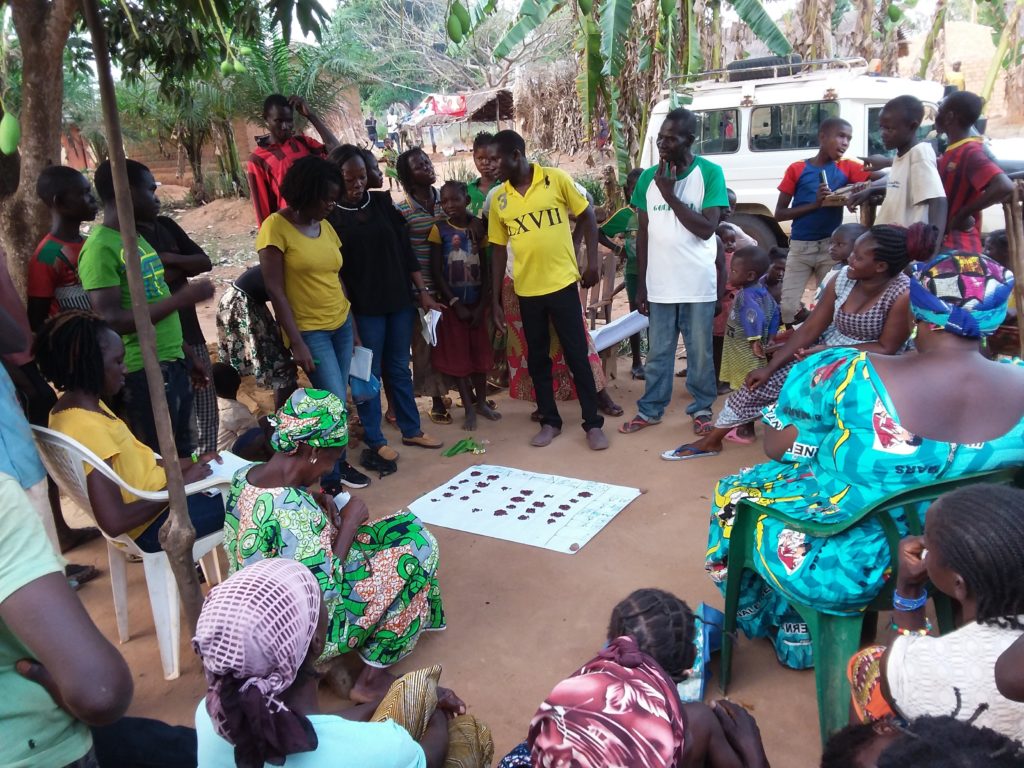Executive Summary
This quarterly performance report describes achievements realized under USAID’s Artisanal Mining and Property Rights Project (USAID AMPR) in the Central African Republic (CAR) between January 1 and March 31, 2019. Key accomplishments include the establishment of the project office in Bangui and a series of assessments intended to inform the design of subsequent project activities. While the Bangui program is still in the learning and design phase, cross-cutting activities were launched to expand understanding of artisanal diamond and gold mining in other countries of interest to USAID.
Throughout the quarter, AMPR expanded its relations with local and international actors working on conflict minerals and peace and reconciliation. The project team met with Search for Common Ground to explore collaboration, coordination and information sharing regarding support to Local Peace and Reconciliation Committees (CLPR). During an evaluation by the International Conference on the Great Lakes Region (ICGLR) of CAR advancements in implementing the Regional Certification Mechanism (RCM), the project team met with mission team. Both parties explored ways to continue sharing information with the IGLR especially with regards to recommendations for setting up a certification and the artisanal gold Chain of Custody (CoC) scheme for the Central African Republic. Meetings were held with the World Bank task manager to review coordinated approaches to supporting the Ministry of Mines and Geology.
Objective 1: Assist Government of the Central African Republic to Improve Compliance with Kimberley Process Requirements To Promote Licit Economic Activities
- Launched a rigorous and participatory diamond fraud diagnosis to identify root causes for the uptake in smuggling and identified ways to improve the enhanced monitoring mechanisms required under the Kimberley Process Operational Framework.
- Provided technical support to the Ministry of Mines and Geology to set up a technical committee chaired by the ministry and comprising donors, the private sector and other relevant stakeholders to coordinate programs and projects in the mining and petroleum sectors of the CAR.
- Initiated direct engagements with the World Bank to contribute to regulatory and institutional reform efforts of the Ministry of Mines and Geology. Tetra Tech submitted to the World Bank a proposal for a single-source procurement intended to complement and strengthen AMPR by supporting capacity building for pre-cooperatives and cooperatives in the recommended site of Boda and Boganagone.
- Drafted lexicon of artisanal mining terminology in French and Sango for eventual incorporation into the Mining Code and to avoid confusions over word choices.
- Launched translation of communication and outreach videos used in Côte d’Ivoire into Sango.
Objective 2: Strengthen Community Resilience, Social Cohesion, and Responses to Violent Conflict in the Central African Republic
- Completed the assessment, in collaboration with the Ministry of Humanitarian Action and National Reconciliation and the Ministry of Mines and Geology of the Peace and Reconciliation committees set up under PRADD II as well as the Kimberley Process Local Monitoring Committees in the compliant zones of Berberati, Bania, Yamalé, Nandobo, Wapo and Nassolé.
- Launched preparations for field missions with the Ministry of Humanitarian Action and National Reconciliation and the Ministry of Mines to evaluate and validate the proposed extension of sites for the Peace and Reconciliation Committees and the Kimberley Process Local Monitoring Committees in the sub-prefectures of Gadzi, Carnot, Nola and Boganangone.
- Completed consultations with stakeholders including representatives of women’s groups in the Kimberley Process compliant zones in Carnot, to develop the project Gender Action Plan and identify economic diversification activities for women. This included a diagnostic of women’s roles in the diamond economy in three villages near Carnot.
Objective 3: Increase Awareness and Understanding of the Opportunities and Challenges of Establishing Responsible Gold Supply Chains in the Central African Republic
- Contracts put in place with IPIS and RESOLVE to analyze the possibilities of implementing responsible supply chains for the gold sector in CAR. IPIS completed the training of the KP Focal Points, AMPR Community Mobilisers and Civil Society representatives on research methodologies, mobile data collection tools using ODK software, participatory methodologies for mine site identification, best practices of conducting field research, and practical exercises on how to use the new generation of ‘GPS InReach’ data tracking hardware.
Objective 4: Improve USAID Programming through Increased Understanding of Linkages Between ASM and Key Development Issues
- Carried out in Ghana a rapid artisanal gold mining assessment combined with a field visit in the Wassa Amenfi West District and the Asankrangwa Stool chieftancy. This assessment identified options for US government programming in the gold sector.
- Launched debate on the dynamics of armed pastoralism in the diamond mining areas of the southwest of the Central African Republic.

